A Guide to the BCG Internship
What to expect from an internship at one of the world's most prestigious consulting firms.
Along with McKinsey & Co. and Bain & Co., Boston Consulting Group is one of the top three management consulting firms in the world. With $8.5 billion in revenue in 2019 alone and over 90 offices across the globe, BCG is a recognized and respected name anywhere you go. If you’re looking to pursue a career in consulting, the BCG summer internship program is a stepping stone to amazing opportunities in the industry, including a full-time offer at the firm. But an internship at BCG is in high demand and short supply, which means you’ll be facing stiff competition. Here’s what you can expect, from the recruitment process to the internship.
What’s the Internship Like?
The BCG consulting internship is open to rising college juniors and seniors, as well as grad students in business school. It’s hosted in over 90 locations, from San Francisco and New York to Malaysia, and while the program duration varies by location, it’s typically 10-12 weeks long. Interns are put on case teams, assigned real clients projects, and often have to travel for part of the week to visit their sites. They also receive lots of training and mentorship outside of their work from current BCGers. According to some sources, United States offices pay $32,000 for MBAs and $18,000 for undergraduate summer interns for the duration of the 10-week program.
Do You Have the Right Background?
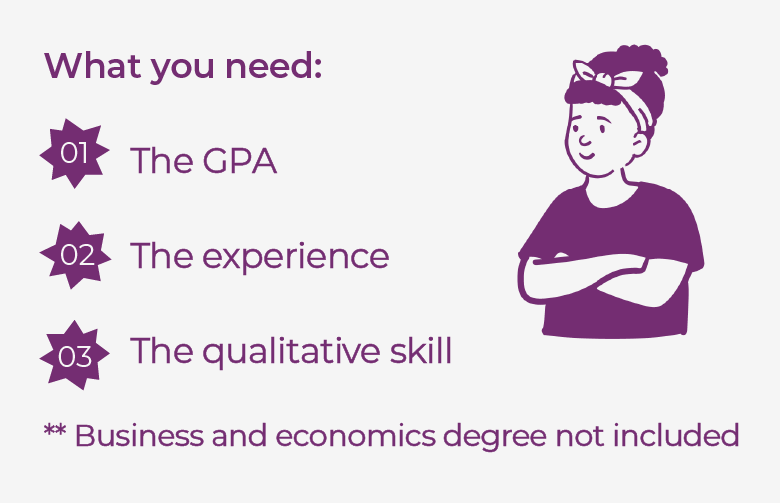
Many consulting firms prefer candidates who come from quantitative backgrounds, like business, economics, statistics, math, etc. But while math skills can certainly come in handy in interviews and on the job, BCG prides itself on hiring students from a diverse set of backgrounds, from science to humanities. One former BCG intern even said, “it’s almost like business students are disadvantaged because a diversity of majors and academic disciplines is really encouraged.”
Academic achievement is important to BCG, with GPA as a natural indicator. Some sources advise that candidates should have a minimum grade point average of 3.6 out of 4.0 in order to prove their qualifications. However, that doesn’t mean anything lower than that is automatically ruled out. A candidate with a 3.2 GPA can still make it to the next round if they can show outstanding achievements to make up for it, like awards, prestigious past internships, or high standardized test scores.
Making the Most of Your Application
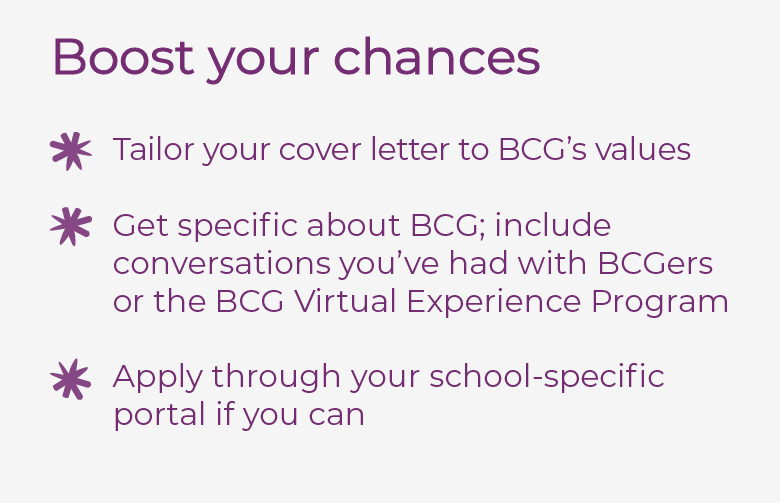
If BCG conducts visits at your campus, you can find your school’s page on their website and apply directly through its portal. Otherwise, you can go through the general online application. Either way, the application just consists of general information, including your background, office preferences, transcript, standardized test scores, resume, and cover letter.
While writing your cover letter, it’s important to cater it specifically to BCG. Boston Consulting Group values teamwork, problem solving skills, passion, flexibility, and curiosity. Therefore, try to highlight these values when talking about projects and experiences. You can also personalize the letter by talking about your specific experiences with BCG that make you want to work there, whether it’s conversations with current associates or completing the BCG Virtual Experience Program.
Before advancing to the interview stage, undergraduate candidates typically have to take the BCG Potential Test, an online assessment that allots you 45 minutes to answer 23 multiple-choice questions. Most questions assess your quantitative and logic skills, like, “Which of the following conclusions are accurate given the following data?” or “Calculate X, Y and Z given the following information.” You’re expected to complete the test without using a calculator or other resources.
Nailing the Interviews
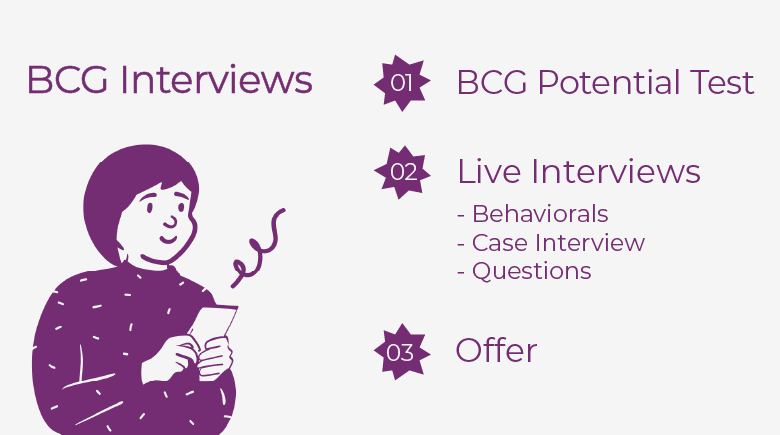
If you make it past the BCG Potential Test, you’ll be invited to a live interview. The BCG website says that the interview process varies by location, but there are usually at least two rounds of live interviews, divided into three parts:
- BCG will strive to learn more about you during each round. You’ll talk about your background and personal experiences so they can assess your fit at the company.
- They’ll assess how you solve problems by giving you a case study to evaluate your thought process, strategic/analytical skills, and ability to make a strong argument for the solution you recommend.
- They’ll answer your questions about the job as they evaluate your ability to listen and communicate effectively, as well as your curiosity and creative thinking.
Knowing more about you
While preparing for the behavioral portion of the interview may not be your first priority, your experience and cultural fit will be significant factors in BCG’s hiring decision. Before the interview, try to come up with thoughtful responses to questions that you know they’ll ask, like, “Why consulting?” or “Why BCG?” Show that you’ve researched the consulting career path and the firm, talked to consultants, and have concrete reasons for why BCG is your top choice.
BCG is also interested in your professional history, so be ready to talk through and answer any questions about your resume. Additionally, think about how to answer other questions that candidates have been asked in previous interviews, such as:
- Tell me about a time you persuaded someone
- What accomplishments have given you the greatest satisfaction
- Tell me about a time you failed
- Tell me about a time you took leadership
- What’s your leadership style?
- Tell me about your greatest challenge on your previous job
Don't know where to start? Try writing a list of accomplishments, significant lessons, and interesting stories from your professional experience. Think about class projects, internships, leadership or volunteer positions, and other task-oriented settings. Once this list is complete, think about which behavioral questions each story could address.
As you move forward in your career, keeping a list of professional achievements is always advised. Starting early will put you ahead of the curve!
👉 For more behavioral interview tips, click here
Assessing how you solve problems
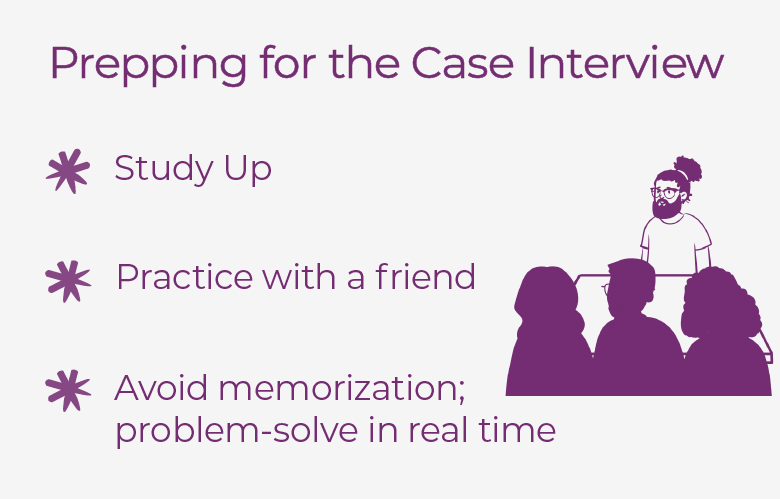
Cases are a staple of the consulting interview process. During a case interview, you will be told about a business scenario and asked to propose a solution. This requires thorough knowledge of the factors that impact organizations, from manufacturing costs to market trends. Luckily, there are plenty of in-depth resources to help you prepare. Popular study materials include caseinterview.com or the book Case in Point. BCG also offers its own resources, such as case interview tips, practice case interviews, and guided consulting cases on its website.
Taylor Smith, managing director and partner at BCG, suggests practicing a case live with a friend or somebody from your career office who can give you feedback. It’s important to learn how to walk someone through your thought process and be able to hit on the right points without rambling. BCG employees also caution against memorizing examples or facts from industries and suggest that you instead focus on being present during the interview. Engage the interviewer, ask for information when you need it, and think about solving the problem collaboratively.
Answering your questions
While this is your time to get more information about the role, your interviewer will still use it as an area of evaluation. It’s important to make the questions insightful, whether they’re about your potential responsibilities, the firm’s history and culture, or even the interviewer’s personal experiences.
If you want to stand out, show that you've looked into the company. Instead of asking general questions, dive deeper into BCG-specific programs/initiatives (think resource groups, volunteer programs, etc), research they have conducted, or articles they have appeared in.
Part of your evaluation will be based on how well you present yourself, so confidence and eloquence are key.
Enjoying the Internship Experience
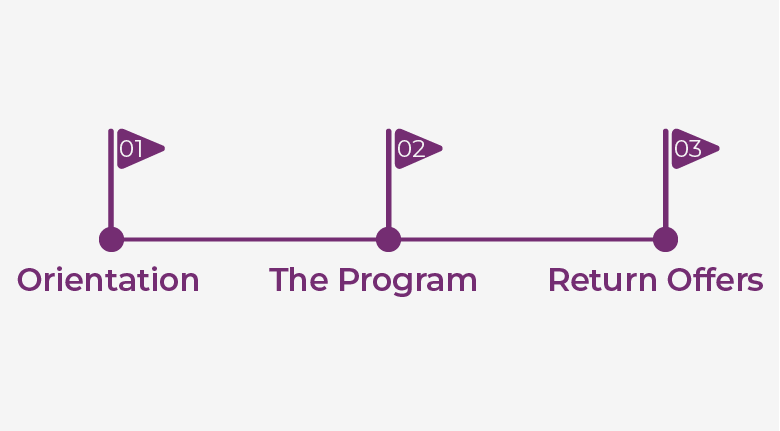
COVID response
Along with every other company, BCG had to make some adjustments to its 2020 internship program. The firm extended full-time offers to all interns, as well as three options for the program itself, as long as they signed the full-time offer within two weeks. First, interns could choose to work at a non-profit of their choice for full pay, giving them an opportunity to make a real social impact during the pandemic. They could work for a startup for 33% pay, which gave them some flexibility like working on their own business or a friend’s project. Or they could do the 6-week virtual BCG internship for full pay. If they didn’t sign the offer on time, they’d be locked into the third option.
The in-person internship
Orientation
While the details of the internship can vary by location, they all follow the same basic structure. For the first three days, summer associates are led through orientation, where they meet the other interns and attend lectures by current BCGers on the skills required in consulting, like problem solving, email communication, and Microsoft Office. They also get their work iPhone and laptop, as well as some introductions to BCG’s time-saving Excel and PowerPoint macros. Finally, they go over the BCG evaluation process, parameters, and benchmarks. Interns are typically assigned their client project within the first few days and head to the client sites during the second week.
The program
Interns are given a lot of hands-on responsibility to manage real client work. Nishad, a former intern at the Bombay office, was assigned to a factory, where he aimed to increase profits by making production more efficient. He would walk around the factory to observe the process and ask questions to the workers and managers for most of the day, and then he would go back to his hotel to do more analysis. BCG works collaboratively with its clients, so Nishad was able to have lunch with the staff, attend internal client meetings, and present his final dashboard to the factory CEO and COO.
Interns also get a lot of support from their BCG team members and associates. Each intern is assigned a buddy-- a current associate who they can meet for coffee and ask for support and career advice throughout the internship. Typically, interns report directly to a 2nd year senior associate, a project leader, or a consultant. They get regular feedback from their project leader throughout the program to give them an opportunity to learn and improve.
Past BCG interns have reported a tight-knit cohort, with plenty of opportunities to bond. On the weekends, they can attend intern events, like office-wide retreats, sporting events, volunteering, meals, and happy hours.
Return offers
BCG says that the vast majority of its interns receive offers for full-time positions. However, this doesn’t mean that it’s guaranteed. In order to lock down a return offer, it’s important to stay focused and show a commitment to your work. Respond to feedback quickly and positively.
Finally, it's important that you show balance and keep a level head. The job is stressful, but it also presents a lot of opportunities to cut loose at parties and other social events. Embrace these factors, but be sure that neither get in the way of your learning experience. In time, you'll find a way to work hard, stay healthy, and have fun!
Cover photo by Boston Consulting Group - https://www.bcg.com/
The information provided herein is for general informational purposes only and is not intended to provide tax, legal, or investment advice and should not be construed as an offer to sell, a solicitation of an offer to buy, or a recommendation of any security by Candor, its employees and affiliates, or any third-party. Any expressions of opinion or assumptions are for illustrative purposes only and are subject to change without notice. Past performance is not a guarantee of future results and the opinions presented herein should not be viewed as an indicator of future performance. Investing in securities involves risk. Loss of principal is possible.
Third-party data has been obtained from sources we believe to be reliable; however, its accuracy, completeness, or reliability cannot be guaranteed. Candor does not receive compensation to promote or discuss any particular Company; however, Candor, its employees and affiliates, and/or its clients may hold positions in securities of the Companies discussed.
